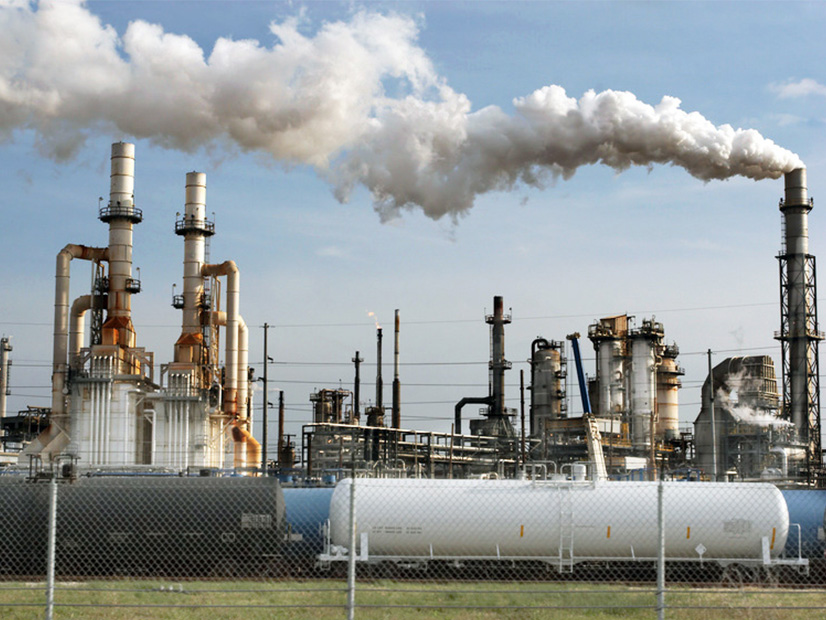
Washington's cap-and-trade bill would set a declining cap on carbon emissions from the state's largest industrial polluters.
| Washington Department of EcologyThe Democrat-controlled Washington Senate on Thursday narrowly passed a cap-and-trade bill designed to trim industrial carbon emissions.
Senate Bill 5126, sponsored by Sen. Reuven Carlyle (D), was approved by a 25-24 vote split almost along party lines. Three Democrats joined 21 Republicans in opposing the legislation. It now goes to the Democrat-dominated House.
The bill would require Gov. Jay Inslee’s office to appoint a task force by July 1 to lead brainstorming efforts on a creating a cap-and-trade program administered by the Washington Department of Ecology.
Under Carlyle’s bill, the task force would create a system to annually set total industrial carbon emissions in the state — a cap that slowly decreases through the years. Four times a year, large emitters would submit bids to the state in an auction for segments of that year’s overall limit and be allowed to emit that amount in greenhouse gases. Companies will be allowed to trade, buy and sell those allowances.
The bill anticipates the auctions would raise several hundred million dollars every budget biennium that the state can allocate to low-income neighborhoods and communities of color.
Preliminary recommendations would be due by Nov. 1, with final recommendations ready to be sent to the legislature by Dec. 1.
The program would tackle facilities that emit 25,000 metric tons or more of carbon emissions annually. There are at least 100 such facilities in the state, including the oil, cement, steel, power industries and large food processing plants.
“Sometimes, you need to step out and do the right thing for the environment and the planet,” Sen. Jesse Salomon (D) said.
Carlyle, chairman of the Senate Environment, Energy and Technology Committee, said,” We do have a responsibility to grow our economy with a smaller carbon footprint.”
“This is a crony-capitalist shell game,” Sen. Phil Fortunato (R) said, referring to the buying and trading features of the bill.
Sen. Shelly Short (R) said, “We’re turning the economy over to an unelected agency,” referring to the Ecology Department.
“We do not do complicated things well, and this is very complicated,” said GOP Senate Minority Leader John Braun.
The bill contains many requirements that the task force must consider. These include the mechanics of measuring emissions and enforcing the proposed regulations, how to set up auctions in which companies would obtain their pollution limits, how the auction revenue should be distributed to disadvantaged communities, how to prevent industries from gaming the new system and how environmental justice issues should be tackled.
A 2021 Washington Department of Ecology report put the state’s carbon dioxide emissions at 99.57 million tons in 2018. It shows that from 2016 to 2018, the transportation sector was the largest contributor at nearly 45% of emissions, followed by industry (19%), electricity consumption (17%) and agriculture (7%). A 2008 law calls for overall emissions to be reduced to 50 million tons by 2030, 27 million tons by 2040 and 5 million tons by 2050.
Republican Countermeasure Fails
Sen. Doug Ericksen, the Republicans’ leader on environmental issues — and a climate change skeptic — argued that trimming carbon emissions is Washington will not effectively cut emissions worldwide.
“Nothing in this will do anything to impact climate. … It’ll just drive jobs out of Washington State. …. It’s not about greenhouse gases, but it’s about raising taxes in Washington,” Ericksen said.
He argued Washington’s manufacturers won’t be able to compete with a more pollution-friendly China.
And he added that the bill’s effects on the state’s five oil refineries will raise gasoline prices by at least 26 cents per gallon, though he didn’t cite a source for that figure.
Carlyle countered that the bill would improve Washington’s climate, with a ripple effect of improving the health of the state’s residents, which translates into a stronger economy. He said the bill will be a strong contribution to meeting the carbon trimming goals of the Paris climate accords.
Ericksen slammed the climate pact, saying, “The Paris accords do not put America first.”
Carlyle noted that the bill routes a significant chunk of cap-and-trade auction revenue to low-income neighborhoods and communities of color, which are disproportionately exposed to carbon pollution.
Ericksen opposed that plank, arguing that all Washington residents are affected equally by carbon pollution.
The cap-and-trade concept surfaced in Washington in 2013, with Inslee first proposing it as a law in 2014. Until recently, Republicans hostile to major emissions measures controlled the Senate, discouraging the Democrat-controlled House from pushing any type of cap-and-trade measure. Democrats took over the Senate in 2018, building up big enough majorities in both chambers to provide cushions for SB 5126 to potentially pass.
State senators introduced two bills to trim carbon emissions this session to reduce carbon pollution to 5 million tons by 2050 — SB 5126 and SB 5373, sponsored by Sen. Liz Lovelett (D).
Lovelett’s bill would implement a tax of $25/ton of carbon emissions beginning Jan. 1, 2022. The tax rate would increase by 5% every year. Energy-intensive industries vulnerable to foreign competition would receive breaks.
That bill died in the Senate’s Environment, Energy and Technology Committee.
However, on the Senate floor Thursday, Republicans tried to replace the cap-and-trade proposal with a $15/ton carbon tax, which Democrats voted down.


